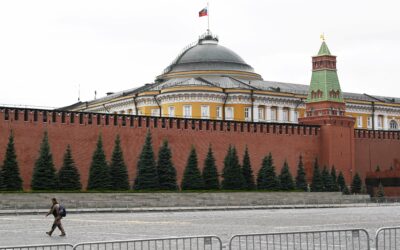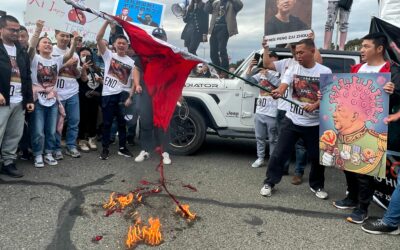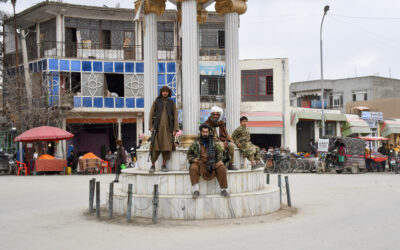
Blindsided by U.S. Ukraine Vote, Kremlin Scrambles to Respond
SUBSCRIBER+ EXCLUSIVE REPORTING — Russia’s reaction to the new infusion of U.S. aid for Ukraine has ranged from shrugs to fury, from warnings of nuclear […] More
OPINION — Like millions of others, I have been riveted to the unfolding tragedy in Ukraine as the world tries to make sense of this senseless slaughter. As a career national security official who has served at CIA, DIA, and the US Army, this is my perspective.
From the outset of this crisis, we consistently failed to predict Putin’s actions despite having an accurate picture of his motivations and the roots of his intent. We viewed him through the lens of our own culture and history and imputed to him similar logical and ethical decision-making characteristics. Putin has been nothing but consistent over decades in his public comments on Ukraine. His earthy nationalist vocabulary clearly telegraphed his thoughts about returning Ukraine to its pre-revolutionary subservience to Russia. And yet we were still surprised when he invaded Georgia, annexed Crimea, and enabled separatist movements in eastern Ukraine. We missed that Putin did not assess risk as we do.
Early this year, Putin deployed Russian military forces to various locations on the Russian and Belarus borders with Ukraine. Their composition and disposition were for attack, not defense. They were positioned for the quickest approach into eastern Ukraine and to Kyiv. In parallel, the Russian military moved additional forces into Belarus to conduct what it claimed were ‘training exercises.’ They never left.
Russian rocket forces tested their weapons to emphasize Putin’s seriousness. And yet despite President Biden’s unprecedented release of compelling intelligence indicating that Putin had made the decision to invade, little was done to prepare. The preference of the armored and mechanized forces Putin assembled to exploit the high-speed roads into Ukraine could have been inferred, but little seems to have been done to impede their use. NATO and the EU were in disunity. Heads of state made pilgrimages to Moscow, believing Putin could be reasoned into not pursuing war, but he remained impervious to their entreaties. He had already decided to set in motion a Russian crusade carrying the banner of his hatred.
Invading Ukraine was not a foreign policy decision, it was a deeply personal one. In a historical sense, the seeds of Putin’s seething hatred for Ukraine were planted as far back as the Russian revolution. Putin saw Lenin’s tolerance toward self-determination by the peoples of the Russian Empire as a critical flaw and a sign of his political weakness. In contrast, Putin sees raw power is the coin of the realm and Moscow’s heavy hand as necessary to inoculate against democracy and dissolution.
His belief extends to a long-standing concept of a unified Slavic state in which an independent Ukraine has no historic, cultural, or political legitimacy. Putin consistently refers to the pre-revolutionary time-frame as his model for Russia’s future. The dissolution of the Soviet Union, an institution Putin considered deeply flawed, nonetheless humiliated the one-time KGB officer, who internalized his own failures to prevent this “catastrophe.” Everything he has done and said since was to make Russia relevant, restore Russian pride, and recapture the lost states of the Empire. In his mind, the first two were impossible without the third. Ukraine and Georgia were only the first to feel Russia’s military wrath for drifting away from Moscow. More will follow as Putin violently recreates his imperial vision.
From his perspective, the invasion of Ukraine could be seen as carrying little risk. He already invaded Georgia, annexed Crimea, and deployed Russian military forces into “separatist” regions of eastern Ukraine. His forces acquired combat experience in Syria, the Ukrainian military was comparatively weak, NATO and the EU were disunited and would likely remain passive, the US was in political turmoil, and the West was conditioned over decades to fear and submit to the Russian bully. An overwhelming military attack would topple the incumbent government and set the conditions for the installation of a puppet government. In the context of Putin’s seething hatred, it would also humiliate the Ukrainian people, destroy their identity, and extinguish the flame of democracy and spirit of freedom.
Now we know that Putin overestimated the competence of his military and underestimated the courage and capability of the Ukrainian military and the resilience of the Ukrainian people. His campaign ground to a halt upon first contact with resistance. While the Russian plan might have been to quickly decapitate the government, their problems multiplied, casualties grew, and progress seemed to freeze. To increase military efficiency, the Russians adopted the Zhukov doctrine of halting their forces and using artillery and rockets to flatten everything in front of them, move through the destruction, stop and repeat until reaching their final objective.
Collateral damage is an alien concept to the Russian army, and Russian leaders are completely insensitive to the international outcry over the genocide now occurring. The deaths of what might be tens of thousands of innocent civilians means little to them. From Putin’s perspective, the victims are responsible for their own fate because they did not surrender.
Today’s constant barrage of information makes it easy for countries to wage disinformation campaigns and your emotions are their weapon of choice. Learn how disinformation works and how you can fight it in this short video. This is one link you can feel good about sharing.
Inspired by the indomitable courage of the Ukrainian people, the US, NATO, and the EU have come together. Russia’s economic isolation is necessary, but perhaps insufficient, to change the outcome of this war. Putin’s wealth and that of senior Russian officials is not reckoned in traditional measures, such as luxury goods, real estate, investments, and on-going business enterprises. Their true wealth is inextricably linked to the wealth and power of the state. Thus, as the Russian state survives, so does their wealth and standing, which insulates them from the effects of the harshest sanctions.
For Putin, invading Ukraine was a deeply personal and emotional decision. As such, the suffering of the Russian people will not factor into his risk calculus. For the Russians, the gold standard for suffering and deprivation was WWII, or the “Great Patriotic War” as they refer to it. The sacrifices made by the Russian people during WWII were staggering, so from the Russian perspective, the loss tens of thousands of civilians in Ukraine might pale in comparison. Putin himself is a product of upbringing through suffering and likely considers the suffering of others to be their duty to the state.
The Russian military now surrounds the beautiful city of Kyiv, where I spent a fair amount of time during my past career. If past is prologue, the destruction and slaughter of innocents will continue until the Russian army has satisfied Putin’s blood lust. Russia will then install a cooperative Quisling government which will struggle to govern. The Russian army will therefore need to remain. This occupation army will become the target of internal and external attacks by Ukrainian patriots. It will be the start of Putin’s forever war, an enduring guerrilla campaign of Ukraine’s fight for freedom and identity.
Sharing informed opinions is important. Opinion pieces represent the diverse views of The Cipher Brief audience and do not represent views of The Cipher Brief.
Read more expert-driven national security insights, perspective and analysis in The Cipher Brief because National Security is Everyone’s Business
Related Articles

SUBSCRIBER+ EXCLUSIVE REPORTING — Russia’s reaction to the new infusion of U.S. aid for Ukraine has ranged from shrugs to fury, from warnings of nuclear […] More

SUBSCRIBER+ EXCLUSIVE REPORTING — When Chinese President Xi Jinping came to San Francisco last November to meet with President Joe Biden, Chinese pro-democracy activists in […] More

SUBSCRIBER+EXCLUSIVE EXPERT PERSPECTIVE — More than two years after its withdrawal from Afghanistan, the U.S. still does not have a clear way forward in the […] More

SUBSCRIBER+ EXCLUSIVE REPORTING — Ukrainians greeted Saturday’s long-awaited House passage of $60.8 billion in aid with justifiable jubilation. For months, their soldiers, civilians, and political […] More

SUBSCRIBER+ EXCLUSIVE REPORTING — A race for control of space is underway, and just as on earth, the U.S. and China are the top competitors. […] More

SUBSCRIBER+ EXCLUSIVE REPORTING — For nearly a week, the Middle East and much of the world were on a knife’s edge, waiting for a promised […] More
Search